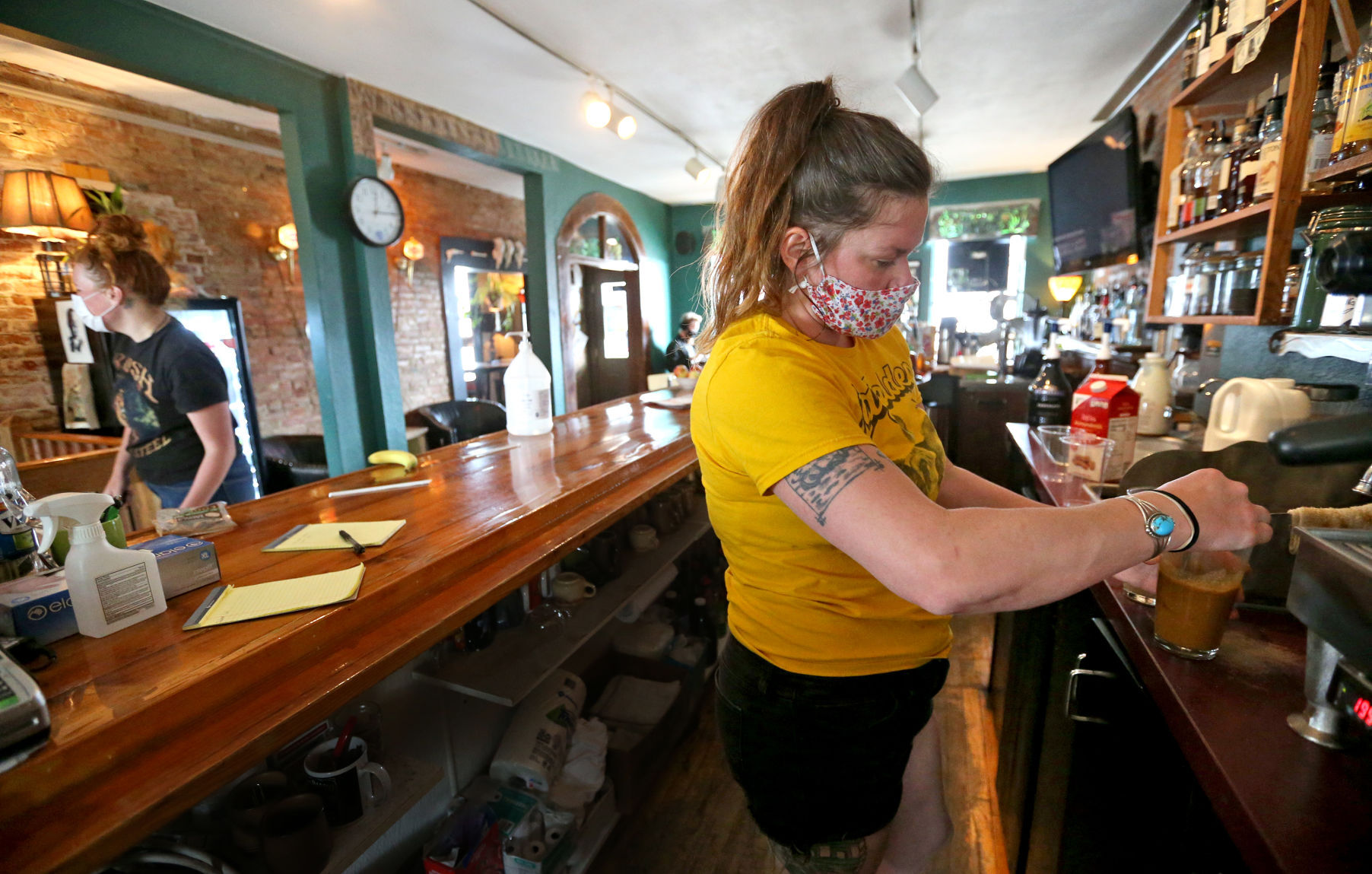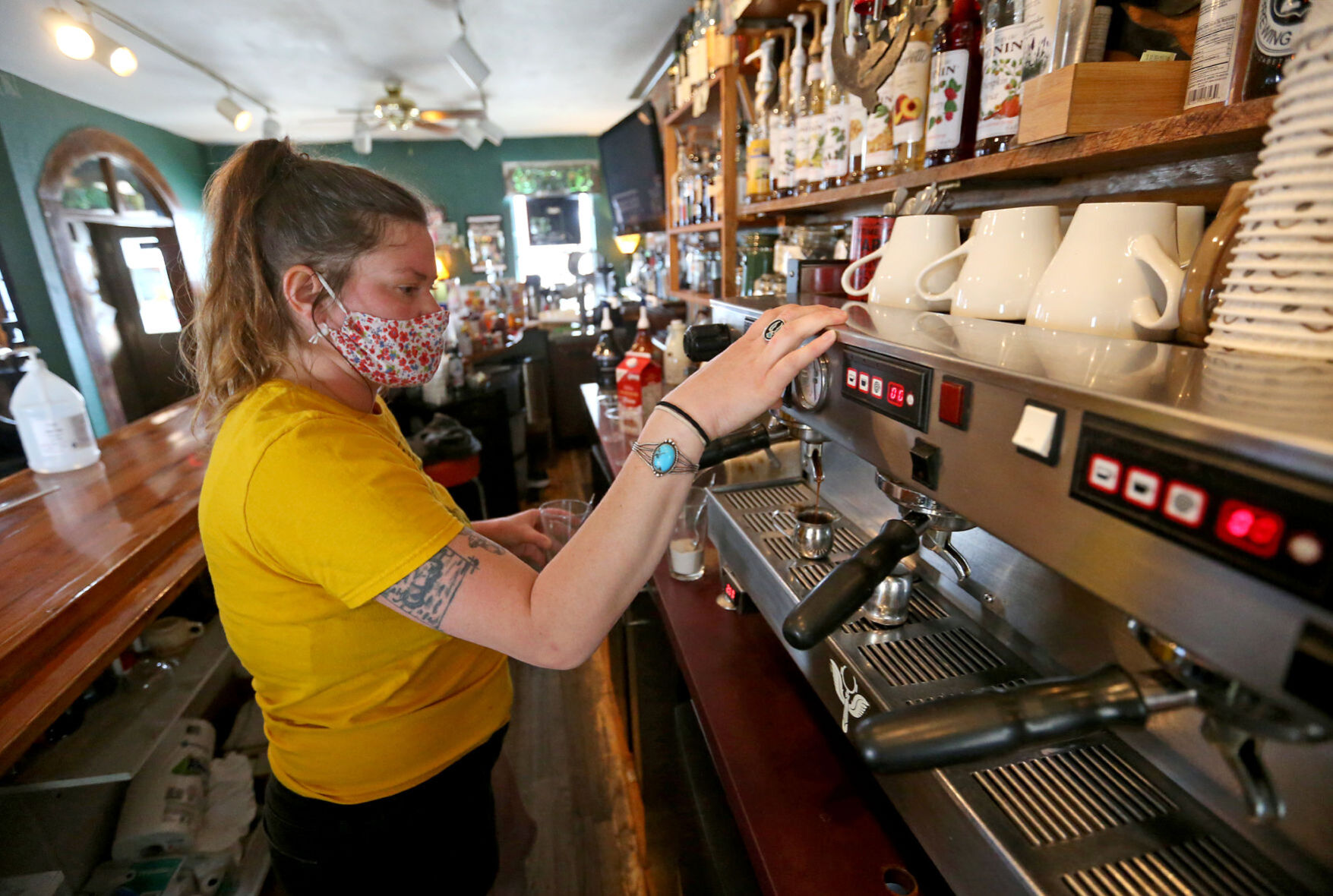When Trish and Kasey Jansen reflect on the spring of 2020, they will recall the health concerns and government shutdowns that slowed activity at their downtown bar and coffee shop.
Without question, the owners of Monk’s Kaffee Pub also will remember the long hours.
Like the heads of many restaurants navigating the early stages of the pandemic, the Jansens were forced to navigate the difficult circumstances with a depleted staff.
“We were working a lot of hours back then,” Trish recalled. “We went 76 days without a day off.”
Recently, business activity is picking up and the overall outlook for Monk’s is improving.
Jansen said the support offered through the Iowa Restaurant and Bar Relief Grant Program is one of the reasons for optimism. Monk’s received a $20,000 grant through the initiative — funds that are being used to replace an espresso machine that is on its last legs.
Monk’s is far from the only restaurant receiving a major boost from the program.
Seventy-five Dubuque County businesses received grant awards through the Iowa Restaurant and Bar Relief Grant Program, including nearly 60 in the City of Dubuque.
Awards ranged from $2,200 to $25,000 locally, with most eateries receiving grants of around $20,000.
Jansen said she appreciates the impact that the grant had on Monk’s, as well as the broader benefit it had on the restaurant industry as a whole.
“When you look at the list of restaurants (benefiting from the grants), a lot of the others are places that we love to go to,” she said. “I think that support is vital for Dubuque and for the community. We need the help. Otherwise, a lot of these places are going to go away.”
STAYING AFLOAT
From the outset of the pandemic, leaders in the state’s restaurant industry recognized that the impact on restaurants could be devastating.
Jessica Dunker, president and CEO of Iowa Restaurant Association, acknowledged that some restaurants and bars benefited from previous rounds of stimulus funding that aided businesses on a broader level. However, her organization believed that a separate program, specifically aimed at the restaurant industry, was necessary.
“On March 17 of last year, restaurants closed for on-premise dining,” Dunker recalled. “On March 18, we started asking for funding.”
Dunker emphasized that, even in typical times, the restaurant industry operates on razor-thin margins. As a result, the viability of hundreds of Iowa eateries came into question as the pandemic forced them to suddenly abandon their preferred business model, shifting away from dine-in services entirely for multiple months and turning to takeout and delivery instead.
“They were shut down so quickly, and they weren’t set up to change (business models) right away,” she said. “They had to pivot on a dime.”
Gov. Kim Reynolds allocated $40 million in federal stimulus funds to aid eligible restaurants. Dunker said these dollars were targeted specifically toward “Iowa-based businesses,” a qualifier that made sure dollars went toward locally owned entities rather than large chains.
While the relief program certainly helped, Dunker believes the state’s eateries aren’t completely out of the woods.
“We are still worried that (the pandemic) will lead to the closure of restaurants in those smaller communities,” she said. “It could have a particularly big impact in rural areas, where there won’t be a new one to come in and backfill (a closed restaurant) if one closes.”
TURNING A CORNER
In addition to metro areas, the state’s relief bill assisted bars and restaurants in rural communities.
There were 13 businesses that benefited in Jackson County; 13 more in Delaware County; 15 in Clayton County; and 10 in Jones County.
At Monk’s Kaffee Pub, signs of a rebound are increasingly evident.
Jansen said there are some days that it feels like things are completely back to normal at Monk’s. That is particularly true on the warm, sunny days, when tourism traffic picks up on Bluff Street and guests can enjoy the social distancing afforded by outdoor seating.
Some days are still a bit slow, Jansen conceded. But she is feeling upbeat about the overall prospects of the business.
“We are feeling really strong about where we are right now,” she said.
During the pandemic, the Jansens repainted the interior of the business and added outdoor seating on the back deck. Monk’s will add a pool table in the near future.
Moreover, the pandemic has reinforced the Jansens’ love for their small, downtown business and the customers who make it possible.
“This experience reaffirmed that we want to keep doing this for as long as possible,” she said. “It made us want to fight for it even more.”



